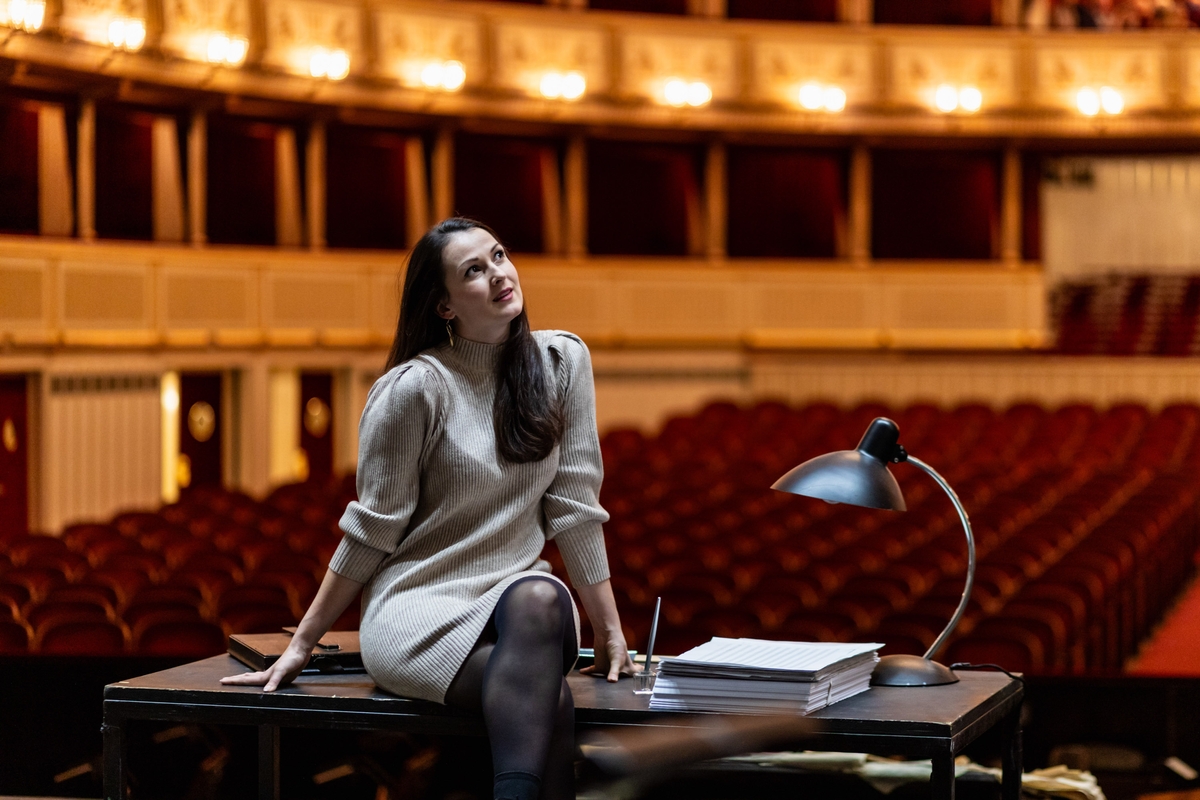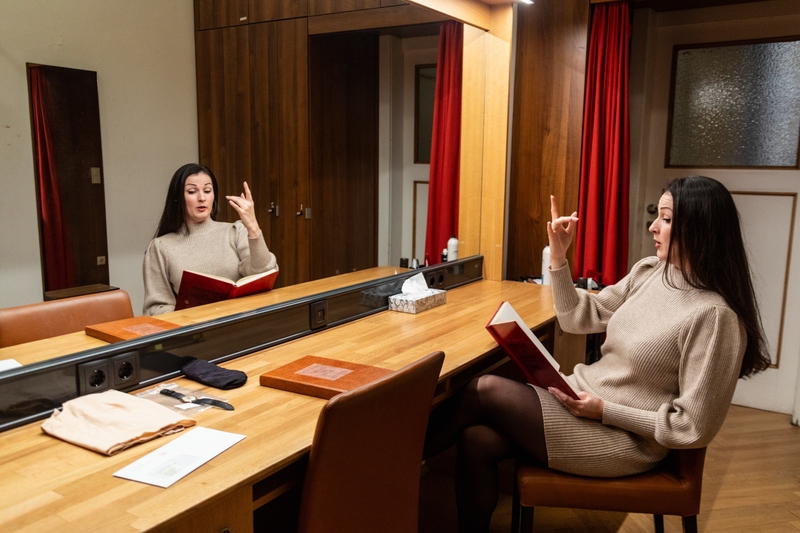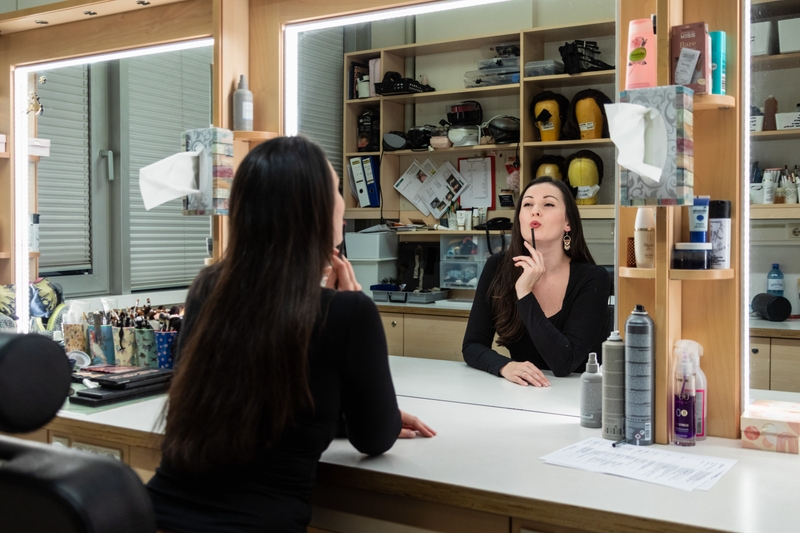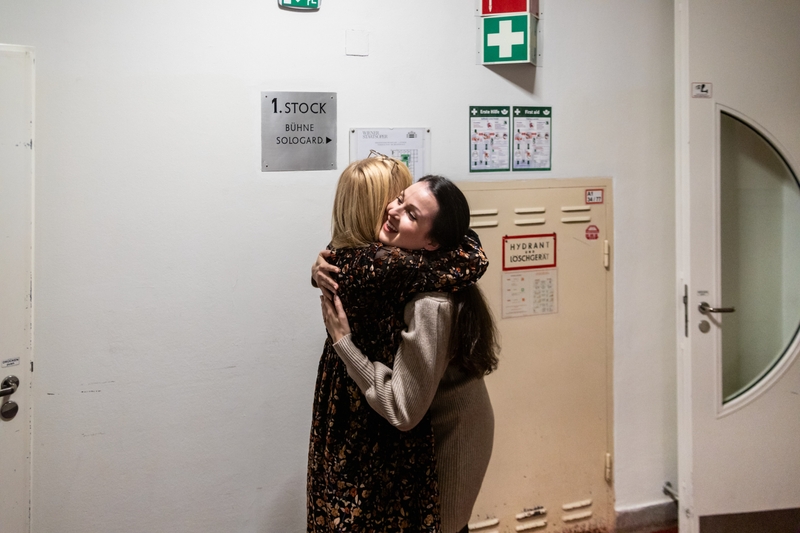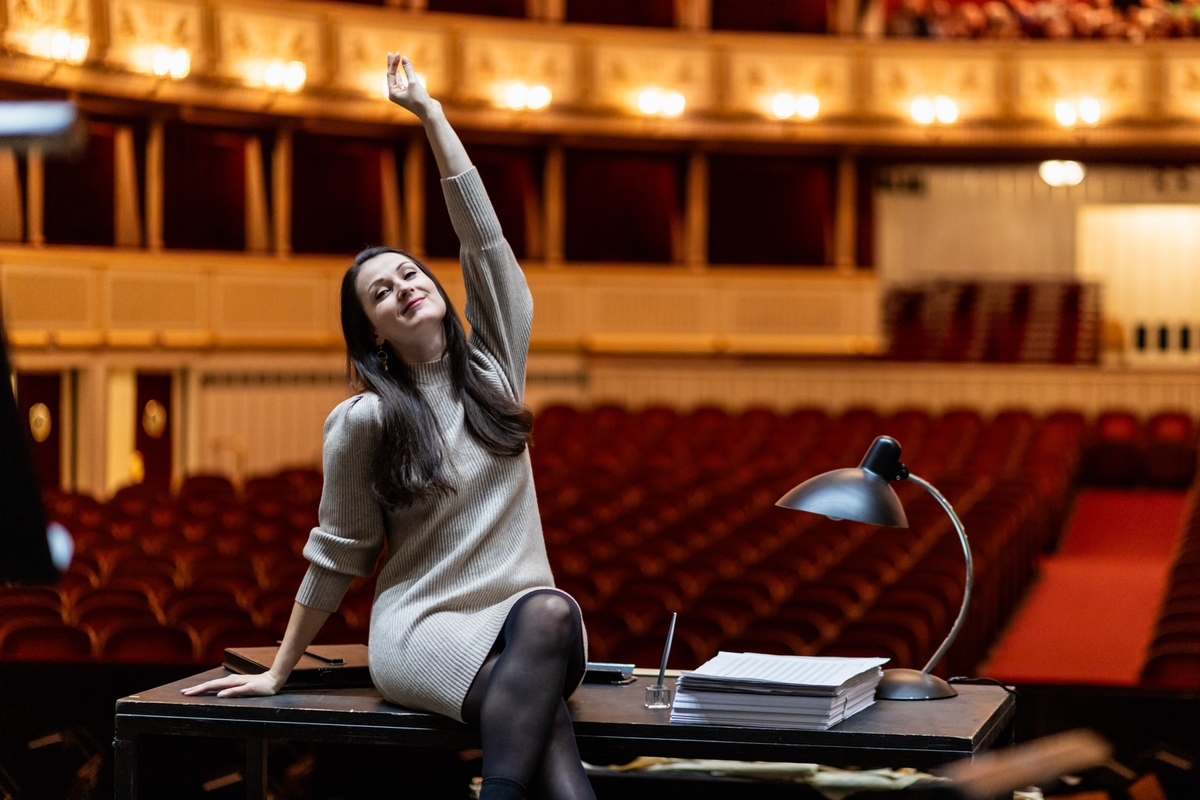Reflection of life
Interview |
Do you still remember? When L'incoronazione di Poppea premiered in May 2021, a new name was on everyone's lips: Slávka Zámečníková. The young Slovakian soprano had won the hearts of audiences and press alike as Poppea and in her beguiling duet with Kate Lindsey. She was compared to the most famous singers in the field and a great career was promised. And they were right. Slávka Zámečníková follows her path with impressive artistic consistency, pleasing audiences at her home theatre in Vienna, performing and succeeding in Paris, San Francisco and Berlin. Now she is about to take on one of the key roles in her field: Pamina in the new Zauberflöte. At the beginning of the intensive rehearsal period, she told Oliver Láng how her professional and private life are intertwined, what questions Pamina asks herself and why this role is particularly challenging. And she describes which part of Die Zauberflöte always particularly moves her.
As a singer, you travel a lot internationally. Does such a life redefine »home«? Where is home for you?
Slávka Zámečníková: There is a double home for me. Firstly Slovakia - that's where I come from and where my family lives. And then Vienna, where I really feel at home. Thank goodness around 40 per cent of my engagements are currently taking place here - I like that and would like to keep it that way. Of course, guest performances also make me happy, but for me, one month abroad is enough. Then I feel homesick again and look forward to the sofa in our flat. The more I travel, the more I miss home. Always being on the road would be very exhausting, especially when you have a family and a partner who is also travelling a lot. This makes it all the more important for me to have a place where we can function as a family. After a few weeks, I feel ready and recharged to continue travelling the world.
And in this Viennese home, is the State Opera something like a third small home?
Absolutely, my first big engagement was here, I had my first big roles here, my first real stressful situations. So this place became my musical home, which it has remained to this day.
So more relaxed than elsewhere?
No, exactly the opposite! At the State Opera, I feel obliged to give an even better performance. That pushes me! Sure, there are smaller theatres where I think to myself: you can fill this shoe well. But that's exactly what I don't want. I don't want to be in a theatre where I don't have to keep pushing myself. Precisely because I'm at home here, I expect more from myself.
Vienna and this house can also be home because you live together with another State Opera singer, Peter Kellner.
That is certainly a big plus. But there's something else too: For us, work and private life are not particularly different. We are no different at the opera than we are at home. For example, when we were on stage together as Susanna and Figaro in Le nozze di Figaro, I thought to myself: Wow, this doesn't feel like a job at all, we really are like that! So one thing leads to another. There is also a lot of music around us at home, Peter's son plays the violin, he sings a lot and I practise. So we don't have a singer or private mode. Nothing has to be switched.
Does it make life easier when you live with a stage mate? Because he simply understands the unusual life of an artist?
Yes, definitely! I have friends who think they could never live with a singer. For me it's the other way round -
It's perfect for me. A relationship with someone who doesn't come from the theatre or has nothing to do with music would be much more difficult for me. Because they have to understand that I'm nervous on a performance day, for example, and don't want to do anything strenuous. That I have to concentrate or practise and that my partner has to look after the family during this time. That some days are "special" because of work. For a colleague, it's all clear, there's not much to explain and tolerance is a given.
"I could do many other things that would also make me happy. But without this job, I just wouldn't be me."
You have had a stellar career in recent years. The young singer who came from an opera studio has become an internationally sought-after soprano. Do you feel artistically mature?
I don't think you really understand the profession until you stop singing. Then you know exactly how you should have done it. (laughs) When you're in the thick of it like that, there will always be questions... But of course: after the many productions I've done, I'm more relaxed. Of course, I still have very high expectations and demands of myself, but I enjoy being a singer more because I no longer want to prove anything to myself. And I can believe in myself. I've also learnt that some things will never change. For example: I always have the feeling that there's a lot to do right now and that I should really be practising again. But it doesn't stop, and sometimes you just have to give yourself a break and stop working. Otherwise, you burn out. Experiences like that only come when you're really in your career. And I've learnt one thing over the last few years: I could do many other things that would also make me happy. But without this job, I simply wouldn't be me.
But have you become someone else? Has Slávka turned into Ms Zámečníková because she is in demand all over the world?
No, I don't feel any different. Of course I'm happy to be able to sing these beautiful parts and to see that the work I've put into the profession has paid off. It's a good feeling to know that people want to hear you. But you can't let yourself be dazzled and you have to be careful with the enquiries. Houses are always asking for more dramatic roles than I am currently singing. Of course, a young singer who can do that is attractive. But I still want to stay in my current fach for as long as possible and not rush into anything.
Which brings us to Pamina. In Vienna, you have already sung the aforementioned Susanna, Servilia in La clemenza di Tito and Donna Anna in Don Giovanni from the Mozart repertoire. How does Pamina relate to these roles?
Pamina is much more challenging than Donna Anna! For me, it's a bit of a "Wagner-Mozart part", in terms of position and difficulty. Quite low at first, rather high at the end. And it's written extremely transparently, very tricky, you can just hear everything. Donna Anna is completely different, I switch on my voice and then the role and the position of the part guide my voice. Servilia, on the other hand, cannot be compared in scope: much shorter! In addition, Pamina is enormously complex: sometimes she is portrayed quite naively, but on the other hand you have to give so much of yourself in the G minor aria, when it's a matter of life and death. That is demanding! So much resonates in the background.
A lot of psychology? The relationship with the mother, with Sarastro?
Pamina's relationship with Sarastro alone: how differently it can be interpreted! Some productions see him as her father, for example, while others show him downright enamoured with her as a woman. I'm currently working with director Barbora Horáková to explore the role very closely: and I like the fact that she's not a naïve, childlike person who simply stumbles into Tamino's love. Instead, she asks herself a lot of questions. About Tamino, for example.
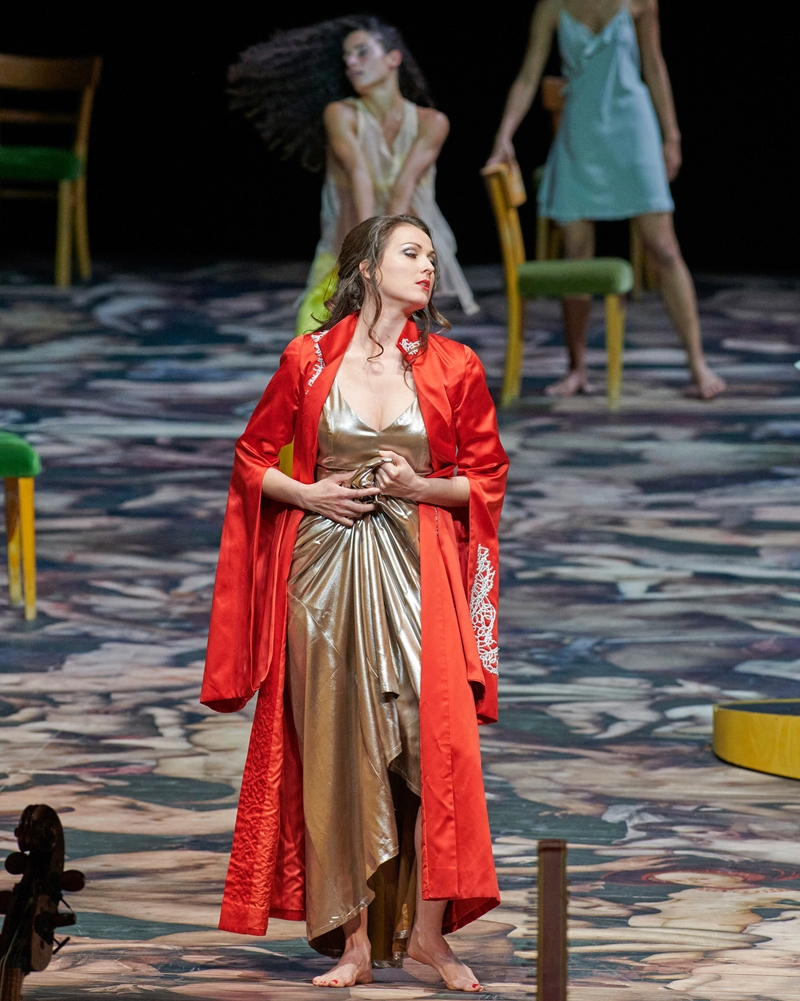
as Poppea in "L'incoronazione di Poppea"
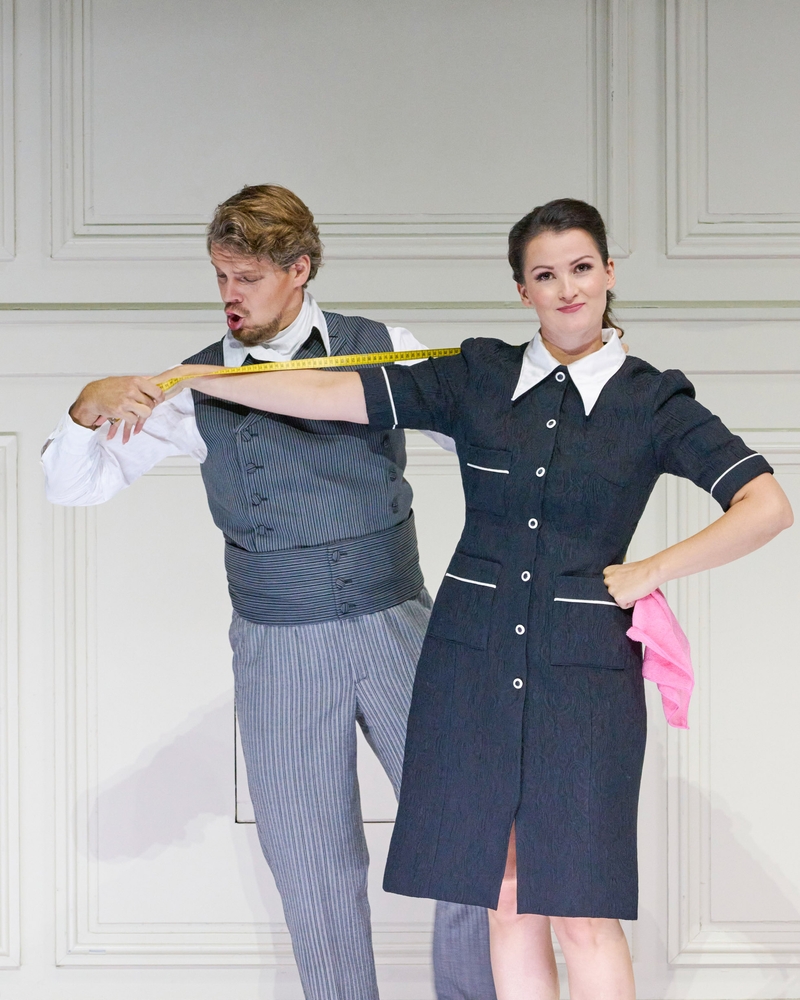
as Susanna with Peter Kellner as Figaro in "Le Nozze di Figaro"
Also about Papageno? Maybe he would be the right one?
Let's put it this way: If I were Pamina, I would choose Papageno. (laughs)
When it comes to Die Zauberflöte, many people ask themselves what this work actually is. A fairy tale? A philosophicum?
I think it always depends on how you want to understand the story and what aspect you are looking for. A work like this is like a large painting, a full-body portrait: everyone sees something different. One person concentrates on the design of the legs, another on the head. In other words, you can experience Die Zauberflöte as a fairy tale. Or as a very philosophical work. Or it can simply be a reflection of one's own life. As in all great works of art, you can find exactly the questions that are currently on your mind. And there is something else: The music provides a catharsis, the soul begins to fly, it is almost transcendental.
Can you find the answers to the questions that will help you?
When I once sang Susanna in Le nozze di Figaro, I received a message from an audience member after the performance: he had been in a bad emotional state before the performance, but the evening had given him clarity and help. Perhaps he recognised himself in one of the characters? Perhaps he was going through something similar? Or the music simply put him in a different state? I don't know... But I firmly believe that a moving evening at the opera can change our lives. Just by being in a different world,and also by dealing with deeply human issues that affect us all. This is particularly true of Die Zauberflöte.
That would almost be a final sentence - but I have one more question: is there a Zauberflöte passage that always makes your heart beat faster? The ultimate catharsis moment?
»Tamino mein! O welch ein Glück!« (Tamino) Whenever I sing this, I am moved to the core. Something happens inside me that I can hardly describe. I almost come out of myself. You know, you live through a role, so many things happen: Happiness and misfortune, hope and pain - and then this little melody comes. And you realise what love can be, what it means for us humans. And you realise what happiness is. Namely to love and be loved. Whenever I sing it, I think of the person I love... There is simply no greater feeling. Not in opera, not in life!
